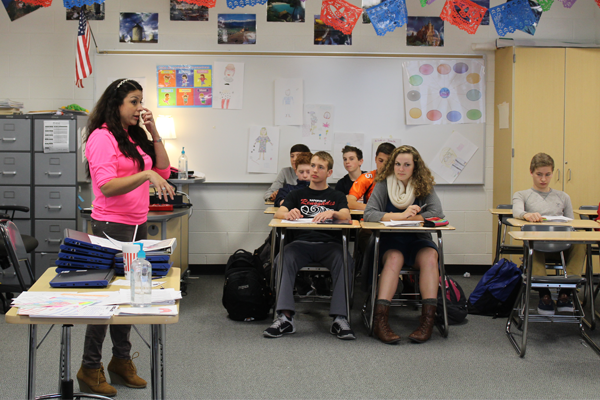By Ashley Walker
Social Media Editor
Photo by Brittany Coates
After the third attempt to find common ground with Indian Prairie Educators’ Association members, the District 204 Board of Education approved the three-year contract last Monday. In this agreement, teachers will have an increased salary of 3.90 percent in year one, a 2.55 percent in year two, and a 2.46 percent raise in year three.
“In the previous contract, we were in the middle of a recession, so this affected our ability to appropriately compensate our teachers. For this round of negotiations, we are seeing a bit of a turnaround in the economy in addition to continued efforts to find more efficiencies in our spending,” President of the Board of Education Lori Price said.
With the agreement of a slightly raised salary and increased stipends for coaches and club sponsors who work after school, retiring teachers are no longer guaranteed retirement health care benefits under the new contract. “Healthcare options and the costs related to healthcare insurance have also changed in the last three years,” Price said.
Along with healthcare, the contract also excluded the end-of-career six percent retirement bumps for teachers retiring under the regulations, but only if the state makes legislative changes or shifts additional pension costs to the district.
Social studies teacher Matthew Main said, “On one hand, I am pleased to move forward and thankful for the work that was put in by the union negotiators. On the other, I’m concerned about the growing size of classes, the uncertainty surrounding the state pension program, and growing list of responsibilities teachers face each year.”
Indian Prairie Education Association President Paul Gamboa, along with other administrators, use a process called Interest-Based Bargaining (IBB) in order to evaluate and understand background information proving the importance of each of the counter-arguments related to the contract. IBB, which is often called “win-win” bargaining, focuses on developing mutually beneficial agreements.
“The biggest difference between the agreement that was ratified and the other agreements was the ratified agreement better respects experience in the district. We also were able to address concerns with how new curriculum is rolled out. Both the board’s team and the teacher’s team used the data we collected and were able to more effectively address teachers’ concerns,” Gamboa said.
The contract resulted in the need for a “Class Size Committee” to be formed that will be composed of up to 10 administrators and 10 teachers that will, “review the district’s class size data and make advisory recommendations for future contract negotiations,” according to a recent announcement made by IPSD.
Considering the success of District 204, as shown in The Stampede’s staff editorial, some teachers questions if the contract compensates for their hard work.
“I think there is an understanding when you become a teacher that you aren’t going to be wealthy but if you put in hard work along the way, your service is rewarded through your retirement,” Main said. “That system may be drastically changed from the time I started to when I retire. If that system changes then I think we are vastly underpaid for the service we provide to the community. I would also say that District 204 teachers are paid an average salary for this area, but achieve results well above average within our schools when compared to others in the area,” he added.
In 2017, the contract may be discontinued if the district has notable financial hardships due to legislative changes from the State.



